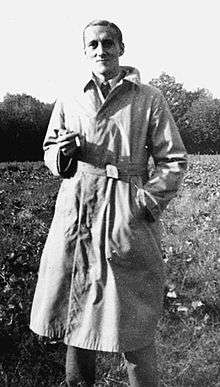Jocelyn Brooke
Jocelyn Brooke (30 November 1908 – 29 October 1966) was an English author born in Kent. He wrote several unique, semi-autobiographical novels, as well as some poetry. His most famous works include the Orchid Trilogy—The Military Orchid (1948), A Mine of Serpents (1949), and The Goose Cathedral (1950)—and The Image of a Drawn Sword (1950).

Educated at Bedales (after escaping twice from a public school) and Worcester College, Oxford, Brooke's childhood revolved mostly around his principal interests of amateur botany and fireworks, in the shadow of the First World War. "When the Second World War began he enlisted in the Royal Army Medical Corps (RAMC) and became one of the pox wallahs, those working to treat venereal disease. Brooke was decorated for bravery."[1] Elements of his experiences, and his love of the military life, appear in most of his subsequent works.
Though the Orchid Trilogy strays into a typically English vein of humour, the idyllic land of his childhood and his obsession with le paradis perdu often bring in an element of intense melancholy, something developed in paranoia and isolation in The Image of a Drawn Sword.
The Goose Cathedral
The old Seabrook Lifeboat station, which is the defining symbol of the third novel in Brooke's Orchid Trilogy, was turned into the Boathouse Café in the 1930s. It is described thus at the end of the book: It was a grey, chilly evening, threatening rain; by the time I reached the bottom of Hospital Hill, it was quite dark. Dimly-lighted, the Goose Cathedral loomed through the blackness; I crossed the road, and approached the back entrance, facing towards the camp. A small conservatory or 'winter garden', like some salvaged fragment of the Crystal Palace, had been built on to this side ...
In the faint electric light, the interior of the café seemed enormous, barn-like...down the sides of the room were placed a number of solid, mahogany tables: the light gleamed vaguely on their polished surfaces...I realized that I was sitting, at last, beneath the roof of the Goose Cathedral - that sinister and sacrosanct chapel-by-the-sea where, in my childhood, the enormous blue-and-red lifeboat had crouched, mysteriously, like a sea-monster in its lair.
Bibliography
- Fiction
- The Military Orchid
- A Mine of Serpents
- The Goose Cathedral
- Dog at Clambercrown
- The Scapegoat
- The Image of a Drawn Sword
- Passing of a Hero
- Private View
- The Crisis in Bulgaria
- Conventional Weapons
- Non-fiction
- Wild Orchids of Great Britain
- The Flower in Season
- The Denton Welch Journals (as editor)
- Ronald Firbank
- Elizabeth Bowen
- Aldous Huxley
- Birth of a Legend
- The Wonderful Summer
- Poetry
- Six Poems [privately printed]
- December Spring
- The Elements of Death
References
- Blondel, N., "Brooke, (Bernard) Jocelyn (1908–1966)", Oxford Dictionary of National Biography, first published 2004; online ed., May 2010.